
4 stroke engine labeled diagram
June 11, 2022 by Himanshu Arora In this article, we will discus about 4 Stroke Engine Working Principle, Diagram. An engine is a device, that converts the energy in a fuel into heat energy and the heat energy into mechanical energy. Before discussing the Four-Stroke engines, we should know the working principle of an IC engine.

four stroke engine Shaik Moin
In compression ignition (CI) engines, burning of fuel occurs due to compression of the fuel to very high pressures. At very high pressures the fuel, i.e. diesel, starts burning automatically without the need of any external flame. The cycle of operation of the CI engine is completed in four-strokes: suction, compression, expansion, and exhaust.

How 4 Stroke Engine Works How Does a FourStroke Engine Work
Category: Science & Tech Also called: Otto cycle or four-cycle engine Key People: four-stroke cycle, principle by which most modern automobile engines function. As illustrated by the figure, while the inlet valve is open, the piston first descends on the intake stroke.

The Four Stroke Engine Cycle [1] Download Scientific Diagram
Four Stroke Engine: Principle: We know that stroke is define as maximum movement of piston in any direction inside engine cylinder. For example if a piston moves form bottom dead center to top dead center is known as a stroke. If it returns back to bottom dead center, it is known as 2 stroke.
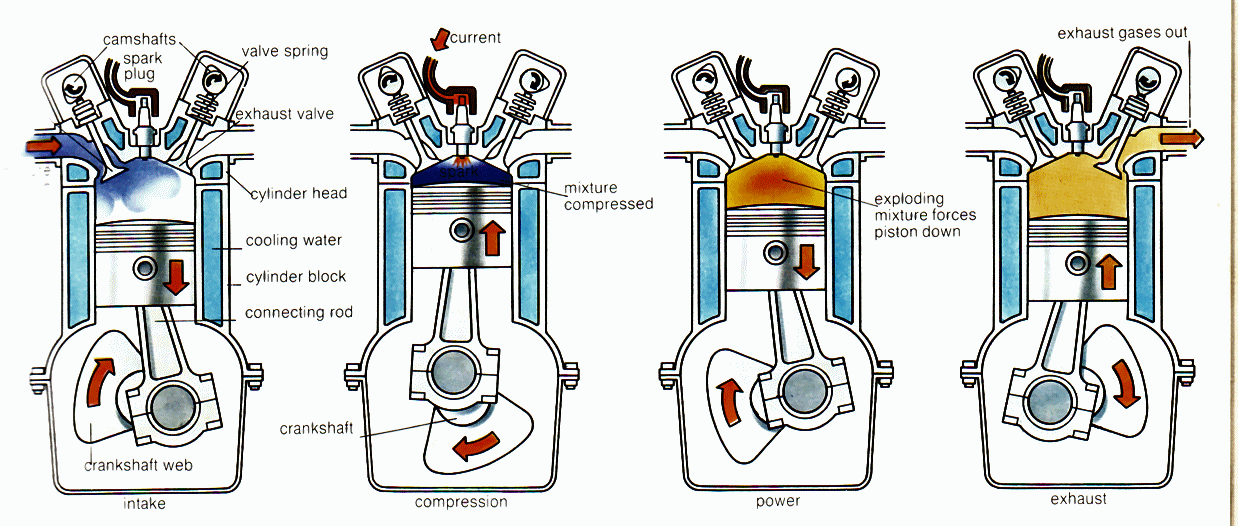
How Does a FourStroke Engine Work
The four stroke engine is probably the most common engine type nowadays. It powers almost all cars and trucks. Speed 10 fps. The four strokes of the cycle are intake, compression, power, and exhaust. Each corresponds to one full stroke of the piston; therefore, the complete cycle requires two revolutions of the crankshaft to complete.
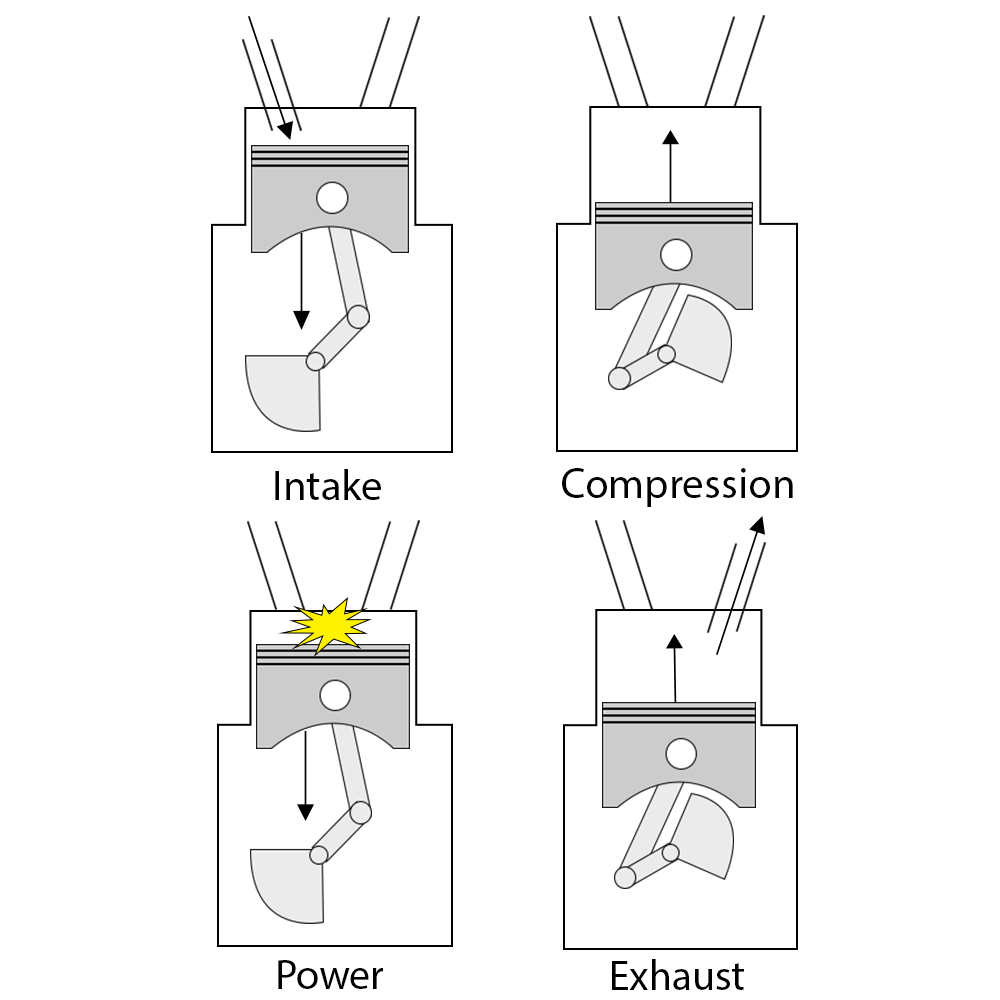
The 4 Strokes of an Engine
A four-stroke engine completes a power cycle after the completion of two revolutions of the crankshaft or 4 strokes of the piston. The 4-stroke engines are most commonly used in motorcycles, automobiles, and other vehicles, as well as in generators and other machinery. These engines are famous because of their high reliability and efficiency.
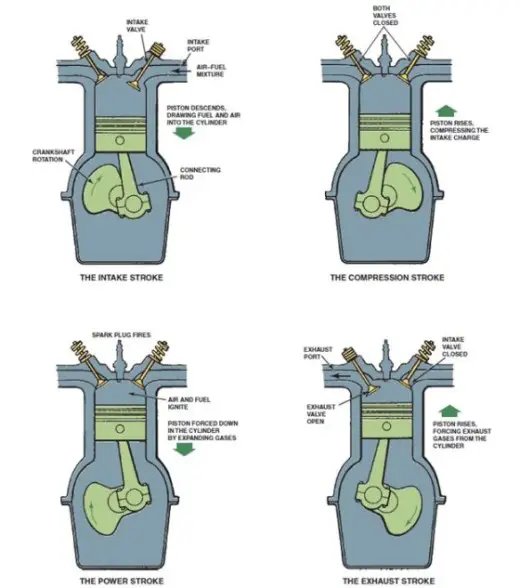
Four Stroke Cycle Engine Operation ASE Certification Training HQ
4 Stroke Combustion 4K SLOW MOTION | 33,000 FPS | Clear Engine Cylinder This videos illustrates the working of 4 stroke engine, with all the four strokes explained and also at the.
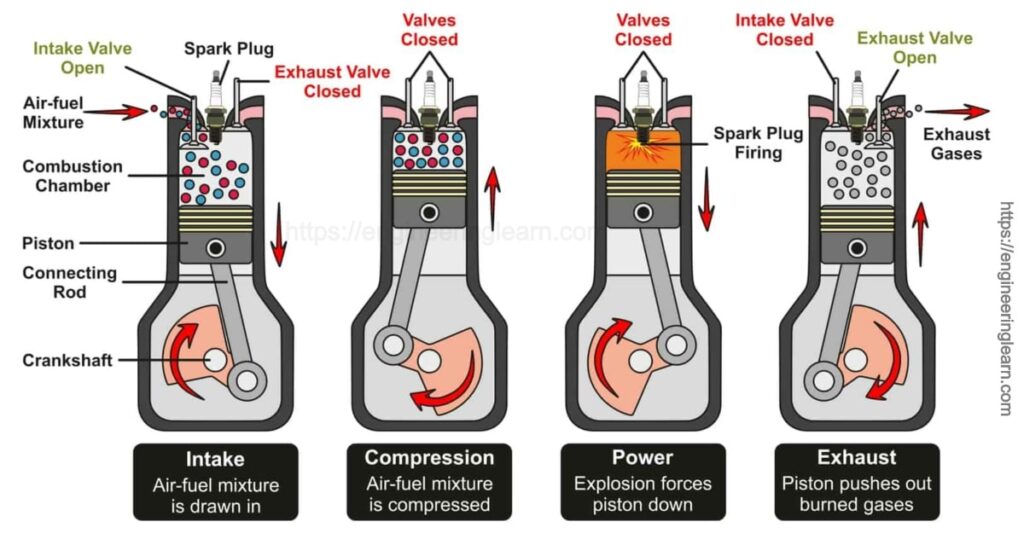
How does 4Stroke Engine Works? and with [Engine Cycle, Diagram
1) The process starts with suction stroke, at the time of suction stroke the inlet valve is open and the exhaust valve is in closed condition. The piston moves from TDC to BDC. Piston sucks the fresh charge from the intake manifold. 2) After the suction of fresh charge both valves get closed.
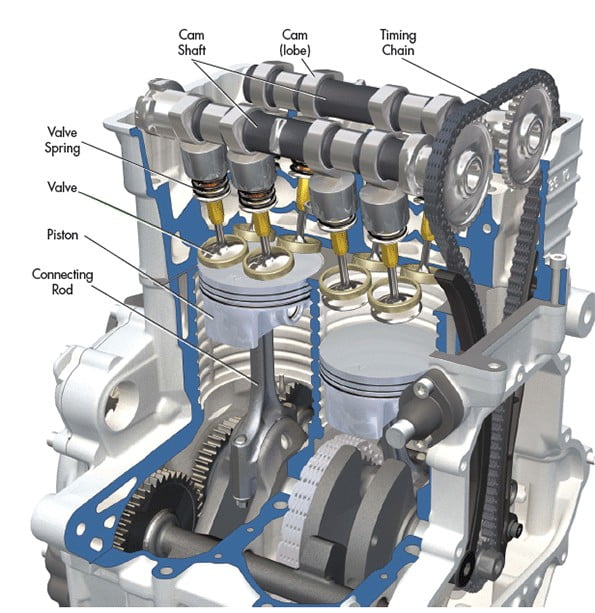
What Are The Components Of 4Stroke Engine? Valves, Cams, Piston etc.
Diagram of four-stroke engines: The Otto cycle Nikolaus August Otto encountered the internal combustion engine built in Paris by Belgian expatriate Jean Joseph Etienne Lenoir. Lenoir successfully accomplishes the double-acting engine that works with an illuminating gas at 4% efficiency and produces only two horsepower.
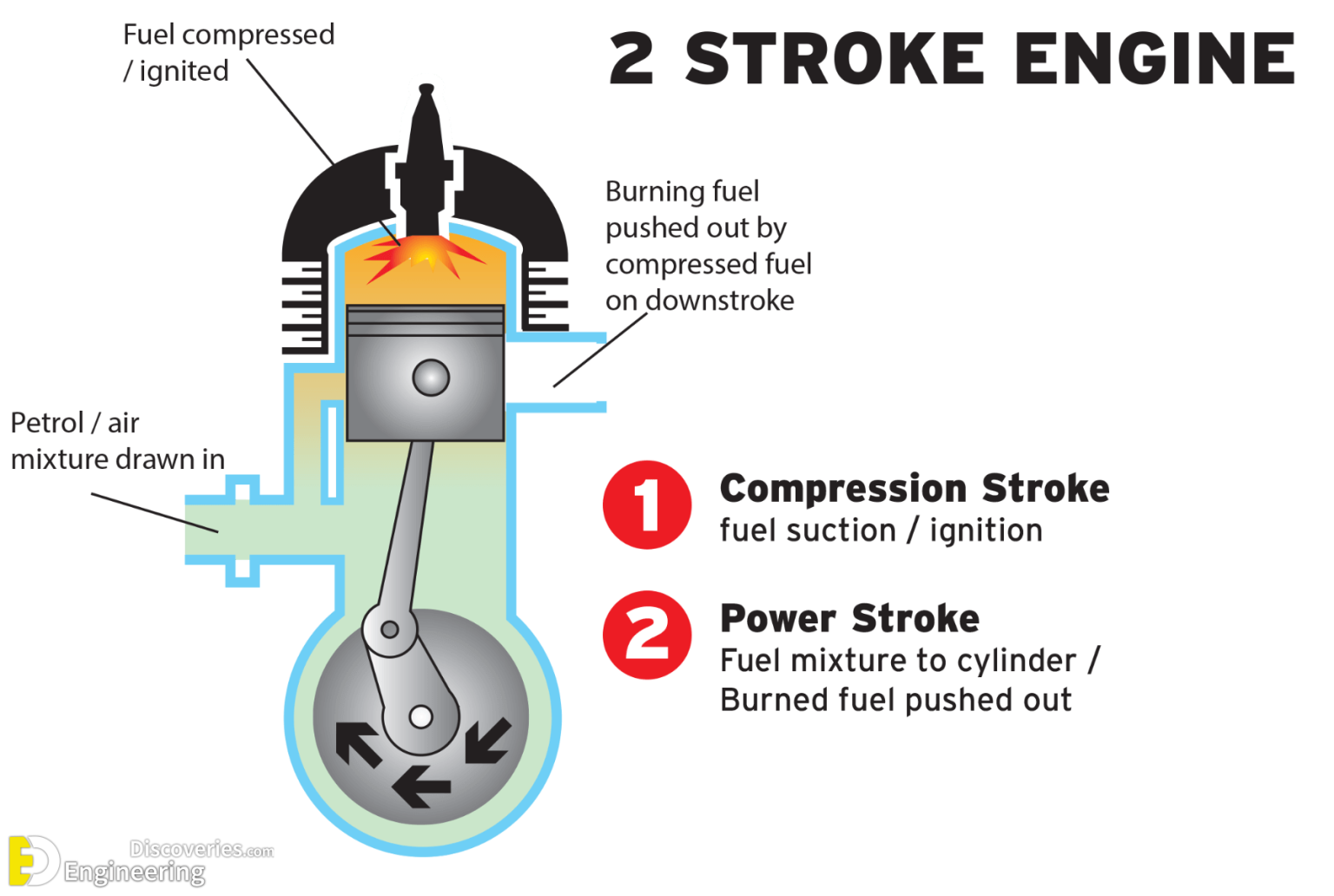
How Does a FourStroke Engine Work Engineering Discoveries
Four Stroke Engine Four-Stroke Engine: Learn Definition, Diagram, Parts, Working, and Uses Last updated on Aug 25, 2023 Download as PDF Overview Test Series A four-stroke engine is an internal combustion engine in which the piston rotates the crankshaft four times.
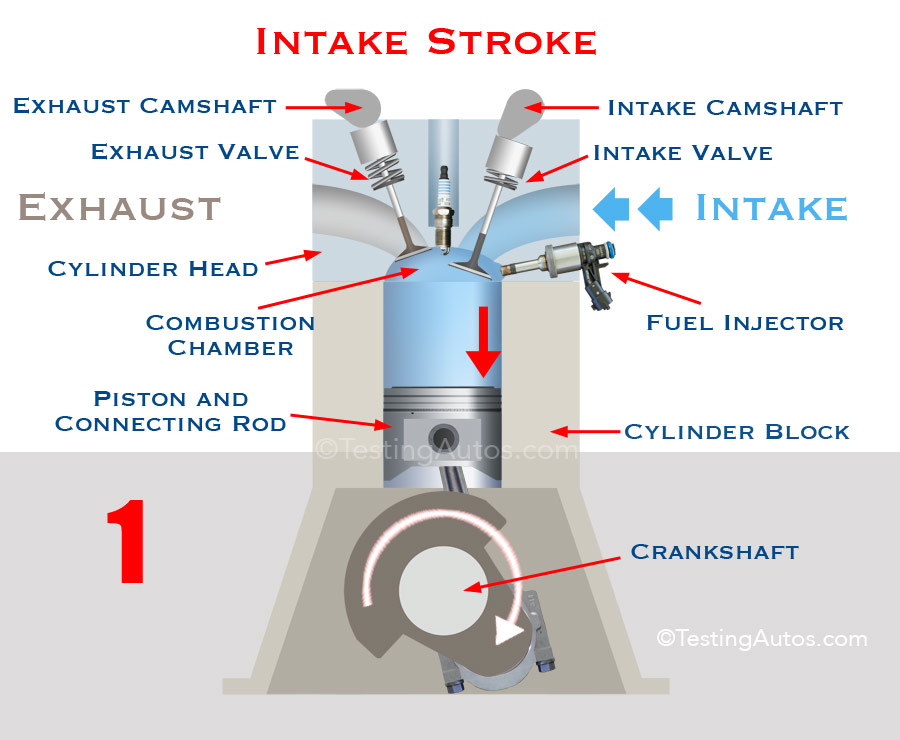
FourStroke Engine Animation, Each Stroke Explained
A four-stroke cycle engine is one of the most common type of small engine which is found completing five Strokes in a singly operating cycle which includes intake, compression, ignition, power, and exhaust strokes. 1. Intake Stroke: ( 4 Stroke Engine ) The intakes required whenever there is a need of air-fuel mixture inside the combustion chamber.

How does a 4 stroke engine work ? MechStuff
The four stroke diesel engine works on the Diesel cycle. The four processes in the Diesel engine are as follows:-. Process 1-2: Isentropic compression. Process 2-3: Constant pressure heat addition. Process 3-4: Isentropic expansion. Process 4-1: Constant volume heat rejection.

FourStroke Engine Auto Upkeep Academy
In a four-stroke engine, the four strokes are: 1) Intake Stroke Starting from "Top Dead Center" (TDC), and zero degrees of rotation, the piston moves down the cylinder. As the piston moves it creates a vacuum and the intake valve opens, sucking air into the cylinder.

Mechanical Engineering Marine Engine 4 stroke
A four-stroke engine is an internal combustion engine that utilises four distinct piston strokes (intake, compression, power, and exhaust) to complete one operating cycle. A complete operation in a four-stroke engine requires two revolutions (720 0) of the crankshaft. In this article, let's study the four-stroke engine. Table of Contents

Cross section showing one cylinder of a fourstroke
Four stroke engine working. To give you an idea of how fast this process occurs. A normal bike or scooter engine usually runs at around 4000 to 6000 rpm. That means 4000 to 6000 rotations of the crankshaft per minute. So in one second, the rotation of the crankshaft is. 4000/60 = 66.6 rps 4000 / 60 = 66.6 rps.
4 Stroke Engine Diagram
The pressure volume diagram (PV diagram) that models the changes the fuel-air mixture undergoes in pressure and volume in a four stroke engine is called the Otto cycle. The changes in these will create heat, and use this heat to move the vehicle or machine (hence why it's a type of heat engine ).